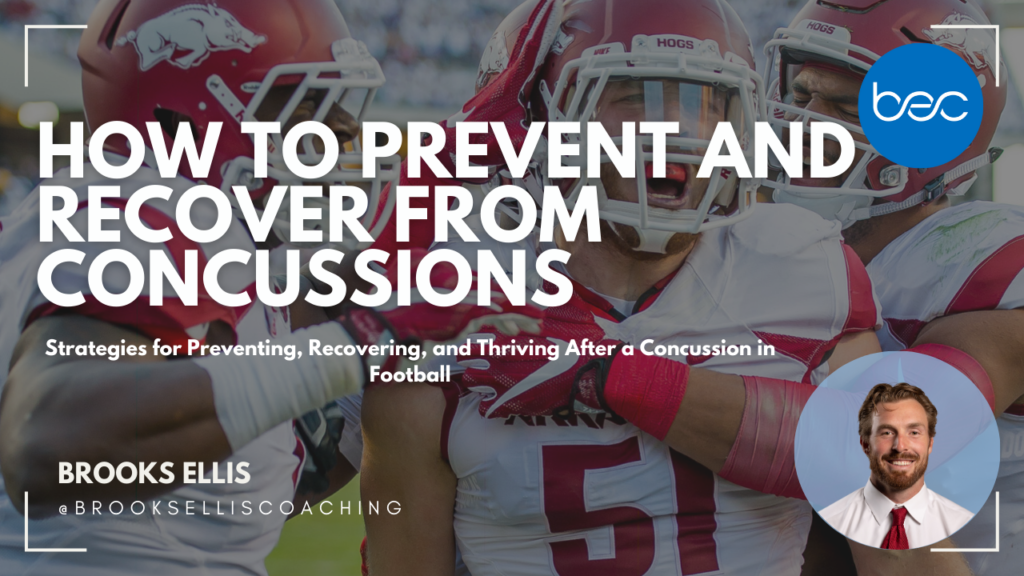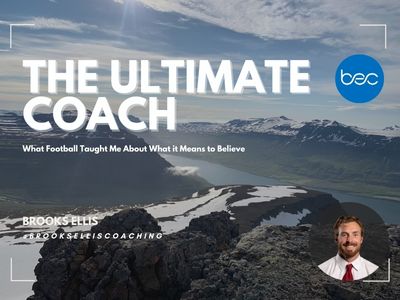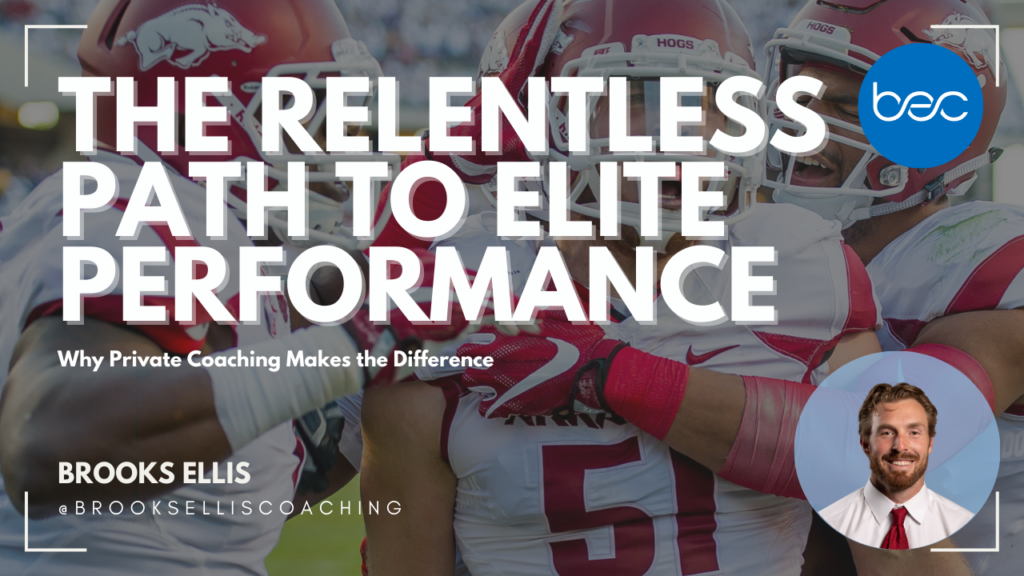Introduction: Protecting Your Brain for the Game and Beyond
Experiencing a concussion in football is one of the worst injuries that can happen to you. Your mind and cognition, a precious tool made in the image of God, are not something to mess with. As football’s greatest critique, protecting the “dome” is the most important thing we can do as football players to ensure we have sustained success on the field and thrive off of it.
In 2018, I suffered my third concussion from football, and it was undoubtedly my worst. I hustled to get back to the field, but sure enough, this hurried and incomplete recovery process ended my career. Unfortunately, through our biggest trials, we learn some of our biggest lessons, and through this experience, I learned the right and wrong ways to recover.
In this article, I’ll discuss the most optimal recovery strategy for preventing and recovering from a concussion so that you can return to the field and your life with confidence that you’re ready to go and fully recovered. I’ll discuss tools and techniques for the prevention of concussions and also what to do in the unfortunate circumstance that you get one.
Prevention First: Setting Yourself Up for Success
First, preventative medicine is the most effective medicine. Therefore, ensuring your mind and body are prepared to handle football is the most effective remedy against the long-term consequences. Sleep is the most critical tool for preparing the mind for battle against the physical and mental opponent across the field, ensuring proper and safe techniques are utilized, and placing yourself in the correct position to make plays.
Sleep is the most underrated tool for sports performance and the most frequently skipped factor in preventing injury. When you don’t sleep, you increase your risk for injury by 70% (1). When you don’t sleep, your body isn’t fully recovered and prepared to perform at the level you’re used to. Your mind is also slower and won’t make the best decisions that require high-speed reactions based on previous experiential knowledge. Football is a very intense game, and suffering the slightest deficit in your mental processing could result in ineffective technique usage, putting yourself and others at risk.
Nutrition is another major factor, as nutrition builds the framework for your mind and body to function optimally. If you’re feeding your body with junk, then you’re body will perform like junk. It will be slower and break down quicker, and you won’t have the energy to push through that last rep that your team needs to win the game. Nutrition is the fuel that allows your body to move at high speeds and long distances. If it’s filled with junk, you’ll be running on fumes and more susceptible to crashing.
We recommend eating a whole-foods diet that removes processed foods and ensures the ingestion of highly satiating and nourishing ingredients. Focus on colorful organic fruits and vegetables, grass-fed/pasture-raised meats, organic nuts and seeds, and organic fats such as avocados, olive oil, and ghee. Focusing on these foods can support your athlete’s optimal growth and performance.
In addition to nutrition, supplementation is critical to ensure the brain has the proper ingredients to sustain high-impact collisions and highly stressful competition. We recommend supplementing with:
- Omega-3 fish oil high in DHA and EPA (from quality sources)
- Creatine Monohydrate
- Magnesium
These three supplements supply brain cells with rich and nourishing fuel that makes the mind happy and hard to bring down.
There are also highly effective tools that help protect you against the effects of a concussion. One is the turtle shell Guardian Caps that most NFL teams wear at practice. If an NFL player wears one, so should you. There is no reason that your coach would not allow you to wear one, and if you’re going to wear one after you get a concussion, why wouldn’t you start before? $70 is well worth protecting you or your athlete’s noggin.
In football, some situations are hard to prevent, but for the most part, using the proper technique is the best way to avoid a concussion. Athletes want to take their heads out of the play by using their shoulders or torso to make tackles or big hits and their hands to address blockers or make blocks. Further, protect your head by ducking out of the way if you’re getting tackled. If you’re in a situation where you can duck your head to plow through another player, you want to be sure you keep your head up.
Recovery Process
In 2018, my protocol was to sit in a dark room and do nothing while my mind rested. No workouts, no stimulation, no social connection, just rest.
If you know me, you know this was torture. I cannot sit still in a room and do nothing, especially when I’m already feeling anxious and alone. When I returned to the field 10 days later, feeling still like a shell and ill-prepared to play, I quickly suffered more problems and left the field.
REMINDER: I’m not a medical doctor, so please do not listen to me over your physician’s recommendations. These are not medical recommendations, just thoughts based on personal experience and peer-reviewed research for healing a broken brain.
However, based on my experience and the latest research (2), utilizing a cross-functional array of remedies, including cognitive behavioral therapy, sleep hygiene, nutritional supplementation (3), mind-body practices (4), low-intensity exercise (5), spending time outdoors in nature (6), and surrounding yourself with friends or family (7), are critical factors in restoring your brain’s functioning to get you back to the field more quickly.
Reminder: These are not medical recommendations, but they are proven ways to improve brain health in a normal state. The brain can learn to relax and heal in small, gentle doses.
After a concussion, the mind and body are subject to the fight-or-flight autonomic state, constantly triggered as if they were restrained to a high-stress environment. Retraining the nervous system through meditation, breathwork, and eating nourishing, low-stress, and anti-inflammatory foods signals to the nervous system that it can relax, bringing it back into equilibrium and into the parasympathetic or rest and digest state that allows healing.
Resting in bed is only helpful up to a point. If you want to maximize your recovery, engaging in these gentle, low-stress activities will accelerate the healing process.
Understanding the Bigger Picture: Football vs. Lifelong Health
It’s important to understand that football is just a game and that your life, well-being, and cognition are MUCH more vital to your lifelong success, happiness, and God’s will than playing football. While playing in the NFL can be life-changing, the chances are rare, and chances are slim to none if you’re a high school athlete. Reality is annoying sometimes, but that doesn’t mean you can’t make the most of your football experience while you can.
Therefore, in high school, if a concussion were to occur, you must realize that your mind is fragile and you’re not tougher than CTE. Even the best football players, the toughest “dudes,” succumb to CTE and concussions, so as a high school player, you should take extra precautions to make sure you’re ready to go before entering the arena once again.
Further, you are more than an athlete, though if you’re a stud in high school, it’s easy to think that’s what makes you you. That was my mindset throughout high school and college, and when I lost that identity in 2018, it was a difficult pill for me to swallow.
Today, I can separate my performance on the field and in life from who I am underneath my strengths, weaknesses, desires, inclinations, tendencies, and shortcomings. I know that I am much more than just a football player and that my happiness in life does not rely upon my success on the field. I learned that the more you rely upon your on-field success to make you happy, the less happy you will be when you finally realize it won’t last forever. It’s what you learn through the process that matters, and God is using this experience for his ultimate glory, our greatest joy in life. And that is more than enough.
Returning to the Field with Confidence
Concussions are not an injury to mess around with. While football is an incredible sport, it certainly has its downsides. Being prepared to prevent a concussion before taking the field and knowing what to do if it occurs will help reduce the long-term ramifications of the injury and secure a healthy and happy brain for you or your athlete.
Don’t take these things lightly. Your brain, mind, and cognition are probably your most important assets, outside of God’s love, as a human. Protect the brain at all costs, and you’ll find a life full of continued growth and success on and off the field.
References:
- Milewski, M. D., et al. (2014). “Chronic lack of sleep is associated with increased sports injuries in adolescent athletes.” Journal of Pediatric Orthopaedics, 34(2), 129-133.
- Elbin RJ, et al. (2023). “Targeted multidomain intervention for complex mTBI: protocol for a multisite randomized controlled trial in military-age civilians.” Frontiers in Neurology. DOI: 10.3389/fneur.2023.1085662
- Barrett, E. C., McBurney, M. I., & Ciappio, E. D. (2021). “Omega-3 fatty acid supplementation as a potential therapeutic aid for the recovery from mild traumatic brain injury/concussion.” Frontiers in Neurology, 12, 646348.
- Posadzki, P., et al. (2014). “Yoga for heart rate variability: A comprehensive systematic review of randomized controlled trials and cohort studies.” Journal of Cardiovascular Medicine, 15(8), 590-600.
- Leddy, J. J., et al. (2019). “Early subthreshold aerobic exercise for sport-related concussion: a randomized clinical trial.” JAMA Pediatrics, 173(4), 319-325.
- Bratman, G. N., et al. (2015). “Nature experience reduces rumination and subgenual prefrontal cortex activation.” Proceedings of the National Academy of Sciences, 112(28), 8567-8572
- Hawkley, L. C., & Cacioppo, J. T. (2010). “Loneliness matters: A theoretical and empirical review of consequences and mechanisms.” Annals of Behavioral Medicine, 40(2), 218-227






